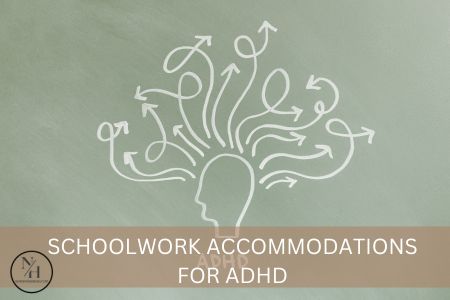Parenting a neurodivergent child can be challenging. But the good news with getting the right diagnosis is that you can be on the right track of understanding your child and knowing how to help him thrive in life.
One area that many neurodivergent children struggle in is the area of schoolwork, and for good reason: their brains aren’t wired like the neurotypical child, and our school system is generally designed with the neurotypical brain in mind! But thanks to increasing research in recent years, we can now understand more of how ND brains process things differently.
When we understand this, we can make—and advocate for—the necessary accommodations to help our neurodivergent child learn better. If your child is homeschooled, you will have to implement these accommodations yourself; if your child goes to a public or private school, it might help to sit down with the teachers and advocate for your child’s needs.
ADHD Symptoms and Accommodation
Attention Deficit Hyperactivity Disorder (ADHD) is one of the most common neurotypes that teachers are quick to point out. We assume this is mostly because its hyperactivity component is usually most evident in a group where everyone is sitting still and there’s this one or two boys who run around the room.
We say “boys” not to stereotype by gender, but based on research, boys with ADHD do tend to exhibit the hyperactivity side of the condition more than girls; some girls, in fact, may be overlooked and even end up undiagnosed, simply because they don’t run around as much—at least, not externally!
In this list, we take into account both the visible symptoms and those that happen inside the ADHD person’s mind, its possible effects on schoolwork and learning, and recommended accommodations to make things more manageable for them:
Symptom #1: Too many thoughts vying for attention
Having one’s brain running in too many directions at one results in possible analysis-paralysis, or not knowing how to start any school work. It may also lead to possible rambling on too many rabbit trails that leave the topic of the lesson.
Accommodation: In the case of oral or written compositions, the parent/teacher may give the student a boost by starting off with a sentence to set the direction; but be sure not to impose what you want the child to write or make by only giving a very general sentence.
In discussions where the child goes off on a rabbit trail, a gentle reminder of the last thought that the child had related to the topic may help bring him back on track.
Symptom #2: Difficulty paying attention
The ADHD child may struggle with paying attention or staying focused. This can happen while reading on his or her own, or in listening to a lecture, or even when engaging in a discussion.
Accommodation: Some parents and educators have noticed that letting the child use fidget toys or allowing them to doodle while listening help these students stay focused.
Symptom #3: Sensory-seeking and needs to keep moving
Sensory Processing Disorder (SPD) is a common co-occurring condition for other neurodivergent diagnoses, including ADHD. If your child is sensory-seeking and thrives on constant movement, that means he or she may become restless when asked to sit still for a long time. (This is one of the most common reasons that teachers advises a parent to have a child tested for ADHD.)
Accommodation: We recommend giving the child time to let off steam by running and being active before being expected to sit. Sensory equipment like swings, trampolines, and swivel seats may help in this need. In homeschool or in some schools, it may help to allow your child to sit on a bouncy ball or swivel in a chair while listening to lessons or engaging in discussion
Symptom #4: Easily distracted
We list being easily distracted as a separate symptom, since we recommend a separate accommodation to deal with distractions.
Accommodation: We highly recommend being intentional at keeping the lesson area as free from distractions as possible (e.g. in a home setting, no younger sibling pestering the ADHD sibling! In a school setting, having the child sit in front, away from talking peers, may help.)
Symptom #5: Disorganization
The student with ADHD tends to have difficulty organizing their school work, and may have difficulty keeping school work in one place.
Accommodation: Using workboxes that divide lessons into specific tasks may help; also, teach him or her to keep a calendar and/or a daily to-do list. When making written assignments, encourage writing down headings and outlines. In terms of keeping output, have a basket or bin where he can automatically store his finished work; that way, everything is in one place throughout the school year
Schoolwork Accommodations for ADHD
Although having ADHD and learning in a school setting may be challenging, it’s not impossible. As you, parents, become more aware of your child’s needs and preferences, you can help advocate for him in school while also training them to understand themselves better.
We have uploaded a FREE poster on Schoolwork Accommodations for ADHD that you may use to help remind yourself of your child’s needs or to advocate for them in a larger school setting.


